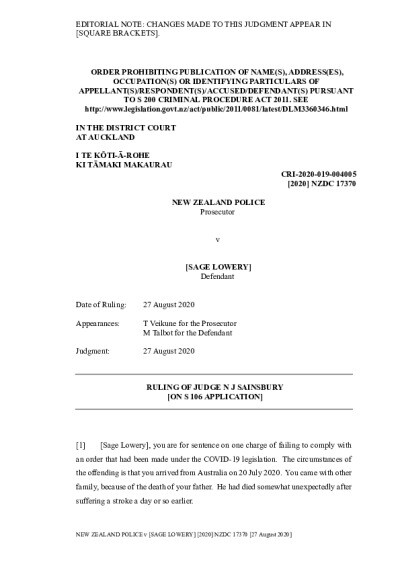
Date
Geographical Area
Pacific
Countries
New Zealand
Keywords
Case Name
New Zealand Police v Lowery
Case Reference
[2020] NZDC 17370
Name of Court
District Court of New Zealand
Key Facts
In response to the rising number of Covid-19 cases within New Zealand and internationally, the New Zealand Government announced that, from midnight 9 April 2020, anyone entering the country would be subject to a 14-day stay in compulsory managed quarantine. This was governed by the Health Act (Managed Air Arrivals) Order 2020.
Travellers were tested for Covid-19 at least 3 times during the 14-day period. When in managed quarantine, travellers were not permitted to leave the quarantine facility except for planned exercise, emergencies, accessing healthcare or moving to another isolation or quarantine facility. However, the traveller could apply for compassionate leave in order to temporarily leave the facility during the 14-day period for events such as funerals.
After the defendant’s father unexpectedly passed away, the defendant, her mother and siblings, arrived in New Zealand on 20 July 2020 to attend the funeral. As they flew from Australia, they were required to complete the mandatory 14-day managed quarantine stay in Hamilton, meaning they would miss the funeral. After their compassionate leave was declined, the defendant and family decided to escape the managed quarantine facility on 24 July and travel to Auckland to pay their respects. All, except the youngest sibling, were apprehended quite soon after escaping. The defendant (18 years old) was charged with failing to comply with an order that had been made under the Covid-19 legislation.
Travellers were tested for Covid-19 at least 3 times during the 14-day period. When in managed quarantine, travellers were not permitted to leave the quarantine facility except for planned exercise, emergencies, accessing healthcare or moving to another isolation or quarantine facility. However, the traveller could apply for compassionate leave in order to temporarily leave the facility during the 14-day period for events such as funerals.
After the defendant’s father unexpectedly passed away, the defendant, her mother and siblings, arrived in New Zealand on 20 July 2020 to attend the funeral. As they flew from Australia, they were required to complete the mandatory 14-day managed quarantine stay in Hamilton, meaning they would miss the funeral. After their compassionate leave was declined, the defendant and family decided to escape the managed quarantine facility on 24 July and travel to Auckland to pay their respects. All, except the youngest sibling, were apprehended quite soon after escaping. The defendant (18 years old) was charged with failing to comply with an order that had been made under the Covid-19 legislation.
Decision and Reasoning
The maximum penalty for the offending was six months’ imprisonment; however, there was a range of culpability which applied. The judge did not consider the offending to be at the upper end of the available sentencing range, which would be offending where someone knowingly and deliberately put the community at risk by escaping quarantine knowing they were Covid-19 positive.
In determining the defendant’s level of culpability, the judge considered a number of factors, including that she complied with quarantine and had been tested (which was negative) prior to the escape. The judge also accepted that she may have had the mistaken belief that one negative Covid-19 test result meant that it was unlikely she had Covid-19 or was a risk to anyone, so distinguished her actions from a situation where someone deliberately took on a risk. The judge also found that this was an impulse decision and considered the ordinary family dynamic meant that it was a decision where she was very much led by her mother – finding that it was unlikely that she would have left on her own. The judge also factored in her age, parity with her younger siblings, and the situation of very real grief at her father’s sudden and unexpected death. Despite the importance of compliance with quarantine in the pandemic, on the basis of these factors, the judge assessed the gravity of offending as low and considered a conviction as out of all proportion with the gravity of the offending.
In determining the defendant’s level of culpability, the judge considered a number of factors, including that she complied with quarantine and had been tested (which was negative) prior to the escape. The judge also accepted that she may have had the mistaken belief that one negative Covid-19 test result meant that it was unlikely she had Covid-19 or was a risk to anyone, so distinguished her actions from a situation where someone deliberately took on a risk. The judge also found that this was an impulse decision and considered the ordinary family dynamic meant that it was a decision where she was very much led by her mother – finding that it was unlikely that she would have left on her own. The judge also factored in her age, parity with her younger siblings, and the situation of very real grief at her father’s sudden and unexpected death. Despite the importance of compliance with quarantine in the pandemic, on the basis of these factors, the judge assessed the gravity of offending as low and considered a conviction as out of all proportion with the gravity of the offending.
Outcome
The defendant was discharged without conviction.
Link
Disclaimer
This case law summary was developed as part of the Disaster Law Database (DISLAW) project, and is not an official record of the case.
Document
Document